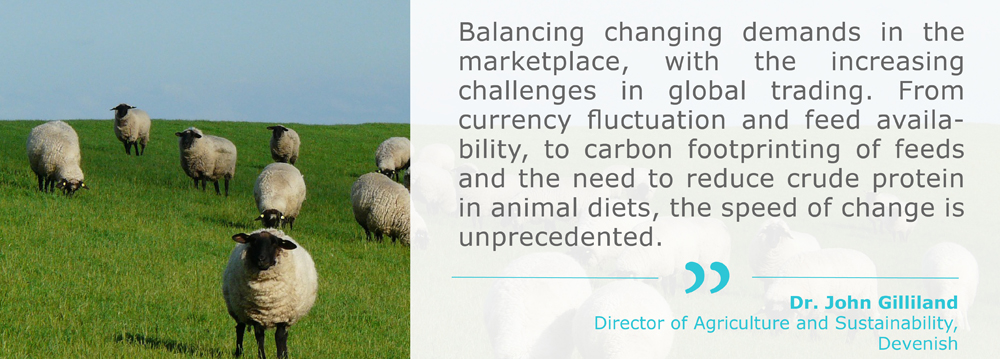Allowing red meat to remain integral within a balanced human diet, delivering carbon neutral beef and lamb by 2025
John Gilliland, Director of Global Agriculture and Sustainability, Devenish
Wednesday, Apr 29, 2020
Over the last couple of years, consuming livestock products have been to the fore in many media outlets, and rarely for the right reasons. Ruminant production has been particularly singled out. Farmers producing beef, lamb and milk have been made to feel Pariahs within their own Communities.
Yet, Ruminants do something us humans cannot do, they thrive on eating poor quality roughage, called grass, and turn it into highly nutritious meat and milk, providing Haem Iron and Vitamin B12, vital for a balance human diet, when eaten in moderation.
In 2013, Devenish, an Irish based, research, development and innovative livestock nutrition company decided to step into this space. It purchased the Lands at Dowth, a 180ha grassland and woodland farm, in the UNESCO World Heritage Site, Bru na Boinne, on the Banks of the River Boyne, Ireland.
What is the aim? Could a system be developed where ruminant farming became carbon neutral by 2025? In a sufficiently transparent, credible, and independently verifiable way, so that Environment Regulators and Consumers, would be reassured; and consumers would still be able to eat a balance diet, knowing that the ruminant products they were consuming were from an independently verified, carbon neutral farming system.
How? Credibility. From the outset this was a key focus. Initially, this focused on Devenish’s Irish research providers, Teagasc and University College Dublin (UCD). As the project has built momentum, Queens University Belfast (QUB), The Scottish Rural College (SRUC) and Wageningen University & Research (WUR) have also engaged.
And furthermore? By taking a whole farm business approach. Farmers can reduce, as well as emit, GHGs. Alongside driving animal efficiency, we wanted to see what else could we do to reduce our overall GHG Emissions within our business. In addition, we wanted to create an annual, whole farm, Carbon Balance Sheet to communicate our collective improvement, within a year, and over several years, to see if we were on track to hit our target of carbon neutrality by 2025.
Moreover, by creating a baseline, measuring our performance against that baseline and manage our actions as a consequence. In 2014, in partnership with Teagasc, we became the first farm in Europe to use an aerial LiDAR survey to audit all our above ground carbon in our trees and hedges. In 2017, we sampled all our soils to 30cm and measured our soil carbon. These two surveys have given us an unique baseline, to which we can now measure our carbon change, over time.
The Result? In 2019, our first, whole farm, carbon balance sheet showed that we were displacing 56% of all the GHGs we were emitting from our beef production. Over and above improving the genetics of our animals, and minimising the numbers of days the animals take to finish; we have now turned our attention, to accelerating carbon sequestration through improving our soil pH, planting multispecies swards, managing our hedges and woodlands and establishing some agroforestry.
We are indebted to all our research partners who have come on this journey with us.
Dr John Gilliland OBE
Director of Agriculture and Sustainability, Devenish
John Gilliland, is Director of Global Agriculture and Sustainability at Devenish, an innovative livestock nutrition company which creates complete solutions, improving animal, human and environmental health, simultaneously. John Gilliland is highly respected and recognised as an excellent leader and communicator across the breadth of the Agri Food and Sustainable Land Management Sectors. He has been an award-winning farmer in Ireland, President of the Ulster Farmers Union; a Non Executive Director of SRUC, and an Energy Regulator in N. Ireland; while at the same time, he has been a policy adviser for Devolved, National and European Governments on Biotechnology, Climate Change and Sustainability.
The views expressed above are those of the author(s) and are not necessarily endorsed by the FFA or its partners.


